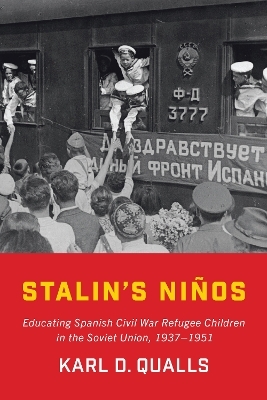
Stalin's Niños
University of Toronto Press (Verlag)
978-1-4875-2275-9 (ISBN)
Stalin’s Niños examines how the Soviet Union raised and educated nearly three thousand child refugees of the Spanish Civil War. An analysis of the archival record and numerous letters, oral histories, and memoirs uncovers a little-known story that describes the Soviet transformation of children into future builders of communism and reveals the educational techniques shared with other modern states. Classroom education taught patriotism for the two homelands and the importance of emulating Spanish and Soviet heroes, scientists, soldiers, and artists. Extra-curricular clubs and activities reinforced classroom experiences and helped discipline the mind, body, and behaviours. Adult mentors, like the heroes studied in the classroom, provided models to emulate and became the tangible expression of the ideal Spaniard and Soviet. The Basque and Spanish children thus were transformed into hybrid Hispano-Soviets fully engaged with their native language, culture, and traditions while also imbued with Russian language and culture and Soviet ideals of hard work, comradery, internationalism, and sacrifice for ideals and others.
Throughout their fourteen-year existence and even during the horrific relocation to the Soviet interior during the Second World War, the twenty-two Soviet boarding schools designed specifically for the Spanish refugee children – and better provisioned than those for Soviet children – transformed displaced niños into Red Army heroes, award-winning Soviet athletes and artists, successful educators and workers, and in some cases valuable resources helping to rebuild Cuba after the revolution. Stalin’s Niños also sheds new light on the education of non-Russian Soviet and international students and the process of constructing a supranational Soviet identity.
Karl D. Qualls is the John B. Parsons Chair in Liberal Arts and Sciences and Professor of History at Dickinson College.
List of Illustrations, Maps, and Tables
Acknowledgments
List of Abbreviations
Introduction
1. “Like Reaching Paradise after Being in Hell": The Turbulent Transition from Spain to the USSR
2. “We, the Spanish, Were like an Island”: Boarding Schools and Personnel as Loci and Models of Care and Soviet Values
3. Obuchenie: Classroom Instruction, Patriotism, and the Instilling of Soviet Values
4. Vospitanie: Kul’turnost’ and Kruzhki as Techniques of Normative Behaviour Training
5. Becoming Soviet in Traumatic Times: Life in War, 1939–1944
6. No Longer Children: Transitioning to Adulthood during War and Reconstruction
Conclusion: Life after Stalin
Glossary
Notes
Bibliography
Index
| Erscheinungsdatum | 10.05.2021 |
|---|---|
| Zusatzinfo | 6 b&w illustrations, 2 b&w maps, 2 b&w tables |
| Verlagsort | Toronto |
| Sprache | englisch |
| Maße | 150 x 226 mm |
| Gewicht | 400 g |
| Themenwelt | Geisteswissenschaften ► Geschichte ► Regional- / Ländergeschichte |
| Geschichte ► Teilgebiete der Geschichte ► Militärgeschichte | |
| Sozialwissenschaften ► Pädagogik ► Allgemeines / Lexika | |
| Sozialwissenschaften ► Politik / Verwaltung | |
| ISBN-10 | 1-4875-2275-4 / 1487522754 |
| ISBN-13 | 978-1-4875-2275-9 / 9781487522759 |
| Zustand | Neuware |
| Haben Sie eine Frage zum Produkt? |
aus dem Bereich


